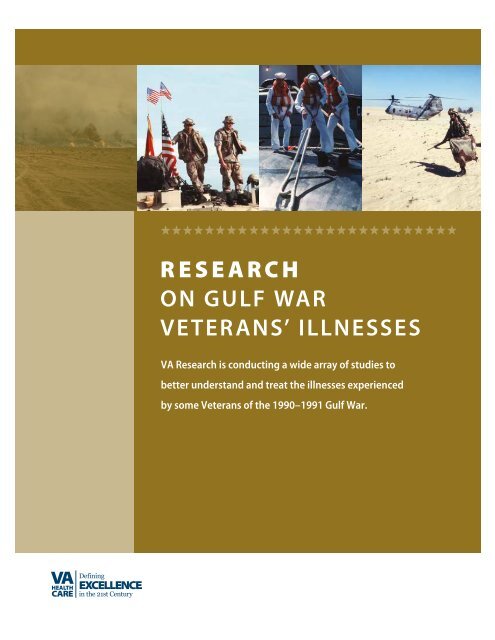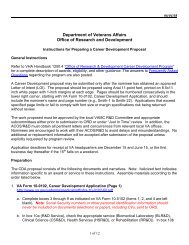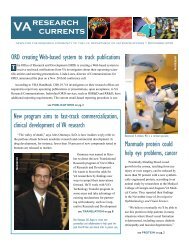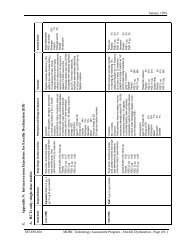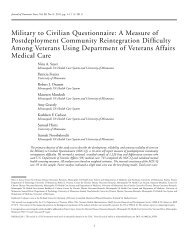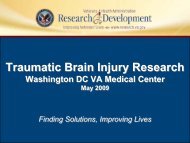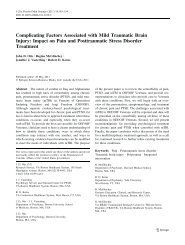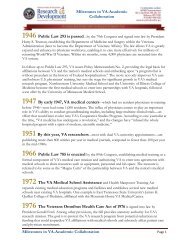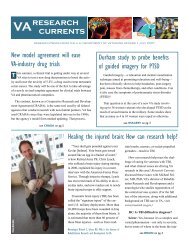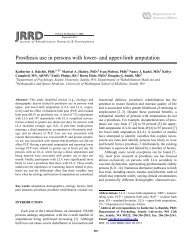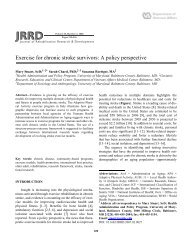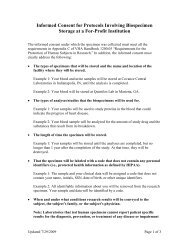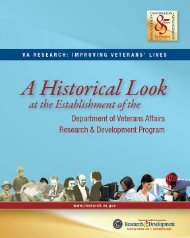Research on Gulf War Veterans' Illnesses
Research on Gulf War Veterans' Illnesses
Research on Gulf War Veterans' Illnesses
You also want an ePaper? Increase the reach of your titles
YUMPU automatically turns print PDFs into web optimized ePapers that Google loves.
ReseaRch<br />
oN <strong>Gulf</strong> WAR<br />
VeteRANS’ IllNeSSeS<br />
VA <str<strong>on</strong>g>Research</str<strong>on</strong>g> is c<strong>on</strong>ducting a wide array of studies to<br />
better understand and treat the illnesses experienced<br />
by some Veterans of the 1990–1991 <strong>Gulf</strong> <strong>War</strong>.
Nearly 700,000 men and women served in the Persian <strong>Gulf</strong> during operati<strong>on</strong>s Desert<br />
Storm and Desert Shield in 1990 and 1991, and studies show that at least a quarter<br />
c<strong>on</strong>tinue to report troubling health symptoms that are not easily diagnosed.<br />
The majority of these Veterans are c<strong>on</strong>sidered to have what VA terms “medically unexplained chr<strong>on</strong>ic<br />
multi-symptom illness.” Others are c<strong>on</strong>sidered to have chr<strong>on</strong>ic fatigue syndrome, fibromyalgia, functi<strong>on</strong>al<br />
gastrointestinal disorders, or undiagnosed illnesses. VA has established a presumptive <strong>Gulf</strong> <strong>War</strong> service<br />
c<strong>on</strong>necti<strong>on</strong> for the above-menti<strong>on</strong>ed c<strong>on</strong>diti<strong>on</strong>s, as well as for a number of infectious diseases, provided<br />
certain c<strong>on</strong>diti<strong>on</strong>s apply.<br />
Our missi<strong>on</strong>, as it relates to <strong>Gulf</strong> <strong>War</strong> Veterans, is to learn more about these illnesses and identify the best ways to<br />
diagnose and treat them. The overarching goal is to improve the health and well-being of those who served<br />
in the <strong>Gulf</strong> and c<strong>on</strong>tinue to experience health problems.<br />
VA’s efforts are guided by a Strategic Plan for <strong>Gulf</strong> <strong>War</strong> <str<strong>on</strong>g>Research</str<strong>on</strong>g>. The plan was developed with input from<br />
leading scientists and researchers in the area of <strong>Gulf</strong> <strong>War</strong> research, physicians, and Veterans themselves. The<br />
plan will be reviewed annually to make sure it incorporates the latest emerging knowledge.<br />
Al<strong>on</strong>g with the specific topics and goals outlined in the Strategic Plan, VA investigators are c<strong>on</strong>ducting<br />
research in many other areas that may be relevant to <strong>Gulf</strong> <strong>War</strong> Veterans, even if the studies are focused <strong>on</strong><br />
broader patient populati<strong>on</strong>s. Examples include studies <strong>on</strong> pain, autoimmune disease, neurodegenerative<br />
disease, sleep disorders, gastrointestinal disorders, respiratory problems, and other chr<strong>on</strong>ic diseases.<br />
All of this work relies <strong>on</strong> the talents and hard work of VA investigators nati<strong>on</strong>wide, and their research<br />
partners. Just as essential are the dedicati<strong>on</strong> and altruism of the many <strong>Gulf</strong> <strong>War</strong> Veterans and others who<br />
participate in this research as volunteers. VA’s visi<strong>on</strong> is that these efforts will not <strong>on</strong>ly directly improve the<br />
health and well-being of thousands of <strong>Gulf</strong> <strong>War</strong> Veterans, but also create a healthier tomorrow for future<br />
generati<strong>on</strong>s of Service members and Veterans.
VA <str<strong>on</strong>g>Research</str<strong>on</strong>g> aims to improve the<br />
health and well-being of those who<br />
served in the <strong>Gulf</strong> and c<strong>on</strong>tinue<br />
to experience health problems.<br />
Epidemiological Studies: What Do We <br />
Know about <strong>Gulf</strong> <strong>War</strong> Veterans’ Health?<br />
Numerous studies by VA researchers and others have<br />
shown that men and women deployed to the Persian<br />
<strong>Gulf</strong> during operati<strong>on</strong>s Desert Storm and Desert Shield<br />
in 1990–1991 reported, and c<strong>on</strong>tinue to report, health<br />
problems at higher rates than those who were not<br />
deployed. Comm<strong>on</strong> symptoms have included headaches,<br />
joint and muscle pain, fatigue, attenti<strong>on</strong> and memory<br />
diffculty, indigesti<strong>on</strong>, sleep disturbances, respiratory<br />
problems, and skin abnormalities. Some of the Veterans<br />
reporting health problems meet the diagnostic criteria for<br />
chr<strong>on</strong>ic fatigue syndrome, fibromyalgia, or certain other<br />
known disorders. Most, however, have what VA terms<br />
“medically unexplained chr<strong>on</strong>ic multisymptom illnesses.”<br />
Most notably, the “L<strong>on</strong>gitudinal Health Study of <strong>Gulf</strong><br />
<strong>War</strong> Era Veterans,” c<strong>on</strong>ducted by VA, is <strong>on</strong>e of the largest<br />
studies <strong>on</strong> the health of <strong>Gulf</strong> <strong>War</strong> Veterans. This study<br />
has compared changes in the health of 1990-1991<br />
deployed <strong>Gulf</strong> <strong>War</strong> Veterans to Veterans not deployed<br />
to the <strong>Gulf</strong>. <str<strong>on</strong>g>Research</str<strong>on</strong>g>ers c<strong>on</strong>ducted a baseline survey in<br />
1995, c<strong>on</strong>ducted a follow-up survey in 2005, and are now<br />
planning to survey this group of Veterans a third time.<br />
Results from the 2005 follow-up appeared in late 2011<br />
in the American Journal of Epidemiology. The report<br />
compared changes in health between 1995 and 2005<br />
am<strong>on</strong>g nearly 9,000 deployed and n<strong>on</strong>-deployed Veterans<br />
of the <strong>Gulf</strong> era. The study c<strong>on</strong>firmed and extended<br />
earlier findings: Deployed Veterans were more likely<br />
than n<strong>on</strong>-deployed Veterans to report new health<br />
problems and greater persistence of existing illnesses.<br />
Differences between the groups were seen in areas such<br />
as limitati<strong>on</strong> of daily activities, repeated clinic visits,<br />
recurrent hospitalizati<strong>on</strong>s, self-perceived health status,<br />
and chr<strong>on</strong>ic fatigue and posttraumatic stress symptoms.<br />
VA c<strong>on</strong>tinues to support epidemiological research<br />
dedicated to understanding chr<strong>on</strong>ic multi-symptom<br />
illnesses and the l<strong>on</strong>g-term health effects of potentially<br />
hazardous substances to which <strong>Gulf</strong> <strong>War</strong> Veterans may<br />
have been exposed, such as depleted uranium or smoke<br />
from oil well fires.<br />
L<strong>on</strong>ger-term plans include a new genetic study of <strong>Gulf</strong><br />
<strong>War</strong> Veterans. The effort entails the collecti<strong>on</strong> of survey<br />
data and the banking of blood in a “biorepository”<br />
to better understand genetic influences <strong>on</strong> <strong>Gulf</strong> <strong>War</strong><br />
illnesses and resp<strong>on</strong>ses to treatments. This study, like<br />
other VA research in this area, is guided by Institute of<br />
Medicine reports; recommendati<strong>on</strong>s from the <str<strong>on</strong>g>Research</str<strong>on</strong>g><br />
Advisory Committee <strong>on</strong> <strong>Gulf</strong> <strong>War</strong> Veterans’ <strong>Illnesses</strong><br />
(www.va.gov/rac-gwvi) and the Nati<strong>on</strong>al <str<strong>on</strong>g>Research</str<strong>on</strong>g><br />
Advisory Council (www.va.gov/advisory/nrac.asp);<br />
and rigorous evaluati<strong>on</strong>s of the existing scientific<br />
and medical literature.
Planning <strong>Gulf</strong> <strong>War</strong> <str<strong>on</strong>g>Research</str<strong>on</strong>g>:<br />
Engaging with Internal and External Partners<br />
To address the health problems that still affect Veterans<br />
of the 1990-1991 <strong>Gulf</strong> <strong>War</strong>, VA has developed a <strong>Gulf</strong><br />
<strong>War</strong> <str<strong>on</strong>g>Research</str<strong>on</strong>g> Strategic Plan. The plan was developed<br />
in 2012 with the help of advisory committee members,<br />
<strong>Gulf</strong> <strong>War</strong> researchers, <strong>Gulf</strong> <strong>War</strong> Veterans, and other<br />
stakeholders. These individuals c<strong>on</strong>tributed suggesti<strong>on</strong>s<br />
<strong>on</strong> future research directi<strong>on</strong>s and areas of emphasis.<br />
Members of the <str<strong>on</strong>g>Research</str<strong>on</strong>g> Advisory Committee <strong>on</strong><br />
<strong>Gulf</strong> <strong>War</strong> Veterans’ <strong>Illnesses</strong> and the Nati<strong>on</strong>al <str<strong>on</strong>g>Research</str<strong>on</strong>g><br />
Advisory Council either took part in the working groups<br />
or recommended others for inclusi<strong>on</strong>. The working<br />
groups included more than 40 people in all.<br />
Importantly, the process by which the plan was<br />
developed was transparent and open to the public,<br />
via open meetings and minutes from all discussi<strong>on</strong>s<br />
posted <strong>on</strong> the advisory committees’ websites.<br />
The great majority of the working groups’ suggesti<strong>on</strong>s<br />
were incorporated into the plan with no change or<br />
modified <strong>on</strong>ly slightly. Some suggesti<strong>on</strong>s had to be<br />
modified or deleted because they were bey<strong>on</strong>d the<br />
scope of a strategic plan for research, or because<br />
they did not c<strong>on</strong>form to federal law or VA policy.<br />
The main focus of the Strategic Plan is the health of<br />
<strong>Gulf</strong> <strong>War</strong> Veterans. While the plan comprehensively<br />
addresses a range of issues related to <strong>Gulf</strong> <strong>War</strong> research,<br />
it str<strong>on</strong>gly emphasizes the need for effective treatments<br />
for the symptoms experienced by these Veterans.<br />
As stated in the plan, “the most urgently needed <strong>Gulf</strong><br />
<strong>War</strong> research studies are those that advance identificati<strong>on</strong><br />
of effective treatments that can substantially improve<br />
Veterans’ health and quality of life, and this is the focus<br />
of the <strong>Gulf</strong> <strong>War</strong> research portfolio.”<br />
The Strategic Plan will be reviewed annually to make<br />
sure it c<strong>on</strong>tinues to effectively address the needs and<br />
c<strong>on</strong>cerns of <strong>Gulf</strong> <strong>War</strong> Veterans.<br />
Also of note is the <strong>Gulf</strong> <strong>War</strong> Veterans <strong>Illnesses</strong>’ Task Force.<br />
This group is c<strong>on</strong>cerned with every aspect of a <strong>Gulf</strong><br />
<strong>War</strong> Veteran’s experience within VA. The group’s latest<br />
report was released in March 2012 and is available at<br />
www.va.gov/opa/publicati<strong>on</strong>s/2011_GWVI-tf_Report.<br />
pdf. A preliminary draft of the report had been posted<br />
<strong>on</strong> the Web to allow interested parties to comment.<br />
This direct feedback helps VA ensure that its activities<br />
are aligned with the medical needs of Veterans.
Finding the Best Treatments<br />
to Help <strong>Gulf</strong> <strong>War</strong> Veterans<br />
The overarching focus of VA’s <strong>Gulf</strong> <strong>War</strong> research is<br />
finding treatments that effectively address the symptoms<br />
experienced by many <strong>Gulf</strong> <strong>War</strong> Veterans.<br />
One recent study, based at the Northport, NY, VA Medical<br />
Center, found that 96 percent of Veterans with chr<strong>on</strong>ic<br />
multisymptom illness experienced breathing problems<br />
during sleep. In c<strong>on</strong>trast, <strong>on</strong>ly 36 percent of <strong>Gulf</strong> <strong>War</strong><br />
Veterans without multisymptom illness experienced this<br />
problem. The study also showed that a therapy known as<br />
nasal c<strong>on</strong>tinuous positive airway pressure (CPAP) can ease<br />
breathing and sleep problems. Some Veterans receiving<br />
the CPAP therapy also reported reducti<strong>on</strong>s in pain and<br />
fatigue, al<strong>on</strong>g with improvements in cognitive functi<strong>on</strong>,<br />
sleep quality, and general health. This pilot study is being<br />
expanded so researchers can better understand the<br />
potential benefits of CPAP therapy for <strong>Gulf</strong> <strong>War</strong> Veterans.<br />
Other studies are addressing the chr<strong>on</strong>ic pain and<br />
cognitive and memory issues that affect many <strong>Gulf</strong><br />
<strong>War</strong> Veterans.<br />
<strong>on</strong>e study is looking at resistance exercise training<br />
as a treatment for chr<strong>on</strong>ic muscle and joint pain.<br />
Pain symptoms, changes in physical activity, and the<br />
overall well-being of patients—including sleep problems,<br />
fatigue, anxiety, and depressi<strong>on</strong>—are being evaluated<br />
through various measures, including MRI studies of<br />
the brain’s pain centers. The expected outcome is that<br />
patients receiving the therapy will have reduced pain<br />
and better physical functi<strong>on</strong>. The researchers also<br />
expect to show the value of MRI as both a diagnostic<br />
test and a way to m<strong>on</strong>itor patients’ progress and<br />
well-being.<br />
Another <strong>on</strong>going study has linked exposure to some<br />
of the same chemicals that were present in the Persian<br />
<strong>Gulf</strong> regi<strong>on</strong> in 1990–1991 with cognitive and memory<br />
problems, and with changes in a regi<strong>on</strong> of the brain<br />
known as the hippocampus. The next phase of the study,<br />
now under way, involves treatments with a combinati<strong>on</strong><br />
of drugs that could help repair the hippocampus.<br />
In other research, investigators are exploring whether<br />
repetitive transcranial magnetic stimulati<strong>on</strong> can treat<br />
chr<strong>on</strong>ic pain in <strong>Gulf</strong> <strong>War</strong> Veterans. This therapy uses brief<br />
pulses of a magnetic field to n<strong>on</strong>-invasively stimulate<br />
areas of the brain. It has been found safe and effective<br />
in treating patients with depressi<strong>on</strong> or stroke, and<br />
researchers in VA and elsewhere have been exploring<br />
other potential applicati<strong>on</strong>s.<br />
Some work that is funded by VA to help <strong>Gulf</strong> <strong>War</strong><br />
Veterans involves approaches rooted in complementary<br />
and alternative medicine, or integrative medicine. One<br />
example is a study at the Puget Sound VA Healthcare<br />
System. <str<strong>on</strong>g>Research</str<strong>on</strong>g>ers are testing a well-validated approach<br />
known as Mindfulness-Based Stress Reducti<strong>on</strong> (MBSR).<br />
Up to 60 <strong>Gulf</strong> <strong>War</strong> Veterans with chr<strong>on</strong>ic multisymptom<br />
illness will complete an eight-week MBSR course, and<br />
researchers will evaluate the effects <strong>on</strong> pain, fatigue,<br />
cognitive functi<strong>on</strong>, attenti<strong>on</strong>, and memory. Yoga and<br />
acupuncture are am<strong>on</strong>g the other therapies being<br />
explored at other sites.<br />
Also, studies in many additi<strong>on</strong>al areas of research may<br />
yield important new knowledge to help <strong>Gulf</strong> <strong>War</strong> Veterans,<br />
al<strong>on</strong>g with Veterans of other eras. These topic areas<br />
include pain, muscle and b<strong>on</strong>e disorders, autoimmune<br />
disease, neurodegenerative disease, sleep disorders,<br />
gastrointestinal disorders, respiratory problems, or<br />
other chr<strong>on</strong>ic diseases.<br />
VA also recognizes the importance of studying other<br />
c<strong>on</strong>diti<strong>on</strong>s that may affect <strong>Gulf</strong> <strong>War</strong> Veterans, such as<br />
brain cancer, amyotrophic lateral sclerosis (Lou Gehrig’s<br />
disease, or ALS), and multiple sclerosis. VA maintains<br />
very active research portfolios in each of these areas,<br />
with the aim of improving life for Veterans of any era<br />
who may be affected.
Improving Diagnostic Methods<br />
VA researchers are working to develop new methods<br />
for diagnosing the chr<strong>on</strong>ic multisymptom illness that<br />
affects so many <strong>Gulf</strong> <strong>War</strong> Veterans. Efforts are also under<br />
way to better define the c<strong>on</strong>diti<strong>on</strong>—based <strong>on</strong> the<br />
latest evidence—and distinguish it from other known<br />
c<strong>on</strong>diti<strong>on</strong>s that may have some symptoms in comm<strong>on</strong>.<br />
Toward this end, VA is funding research aimed at better<br />
understanding the genetic, physiological, and other<br />
biological factors underlying <strong>Gulf</strong> <strong>War</strong> Veterans’ illnesses.<br />
This will enable scientists to identify reliable biomarkers—<br />
an important step toward improved diagnosis.<br />
In <strong>on</strong>e study, based at the Center for Imaging of<br />
Neurodegenerative Disease at the San francisco VA<br />
Medical Center, researchers used magnetic res<strong>on</strong>ance<br />
imaging (MRI) to compare two groups of Veterans—<strong>on</strong>e<br />
made up of <strong>Gulf</strong> <strong>War</strong> Veterans who were likely exposed<br />
to organophosphate chemicals—namely, the chemical<br />
warfare agents sarin and cyclosarin—and the other<br />
composed of Veterans who were not exposed. The imaging<br />
study identified brain differences between the two groups.<br />
While more testing needs to be d<strong>on</strong>e, this approach may<br />
lead to a reliable method for identifying Veterans with<br />
chr<strong>on</strong>ic multisymptom illness.<br />
The San Francisco study added to earlier findings, from<br />
a team at the Bost<strong>on</strong> VA Healthcare System, showing<br />
“subtle but persistent central nervous system pathology<br />
in <strong>Gulf</strong> <strong>War</strong> Veterans potentially exposed to low levels<br />
of sarin/cyclosarin.”<br />
The San Francisco group has also found differences in<br />
the size of the hippocampus—a brain regi<strong>on</strong> critical<br />
in memory and learning—in <strong>Gulf</strong> <strong>War</strong> Veterans with<br />
a diagnosis of posttraumatic stress disorder.<br />
The same researchers are now c<strong>on</strong>ducting further MRI<br />
studies comparing the levels of an important brain<br />
chemical—N-acetylaspartate—in the brains of <strong>Gulf</strong> <strong>War</strong><br />
Veterans with and without chr<strong>on</strong>ic multisymptom illness.<br />
Other new studies are using a relatively new imaging<br />
technique called magnetoencephalography (MEG) to<br />
study how the brain works. MEG detects very weak<br />
magnetic signals produced by brain cells. Studying<br />
these signals can help determine which parts of the<br />
brain are functi<strong>on</strong>ing normally and which are not.<br />
The goal is to identify certain signature patterns that<br />
may identify those with chr<strong>on</strong>ic multisymptom illness.<br />
This work, based at the Minneapolis VA Medical Center,<br />
is supported in part by the American Legi<strong>on</strong>.<br />
BIoMARkeRS of <strong>Gulf</strong> WAR<br />
VeteRANS’ IllNeSSeS<br />
Some <strong>Gulf</strong> <strong>War</strong> research c<strong>on</strong>ducted by VA scientists is<br />
supported through the Department of Defense and the<br />
C<strong>on</strong>gressi<strong>on</strong>ally Directed Medical <str<strong>on</strong>g>Research</str<strong>on</strong>g> Program.<br />
This research includes the following two promising<br />
studies of potential biomarkers:<br />
Dr. r<strong>on</strong>ald bach of the<br />
Minneapolis VA Medical<br />
Center is examining the level<br />
of a protein called “tissue factor”<br />
in blood samples from <strong>Gulf</strong><br />
<strong>War</strong> Veterans. The protein<br />
promotes healthy clotting.<br />
Too much of it, however, can<br />
restrict blood flow in small<br />
blood vessels throughout the<br />
body. Over time, this can lead to symptoms such as pain,<br />
fatigue, and slowed thinking — all associated with <strong>Gulf</strong> <strong>War</strong><br />
Veterans’ health problems. Dr. Bach’s team, which also has<br />
funding from VA, is also measuring other proteins linked<br />
to coagulati<strong>on</strong>, as well as to inflammati<strong>on</strong>. The researchers<br />
hope their analysis will uncover new biomarkers for <strong>Gulf</strong><br />
<strong>War</strong> Veterans’ illnesses.<br />
Dr. maxine Krengel, with VA and Bost<strong>on</strong> University,<br />
and colleagues are using magnetic res<strong>on</strong>ance images of<br />
the brain and neuropsychological testing to explore the<br />
possible l<strong>on</strong>g -term neurological effects of toxic substances<br />
to which some <strong>Gulf</strong> <strong>War</strong> Veterans were exposed. One category<br />
of substances includes pesticides that inhibit an enzyme<br />
called acetylcholinesterase, important for proper brain<br />
functi<strong>on</strong>. Another substance is a drug that was used<br />
to protect against nerve gas, known as pyridostigmine<br />
bromide, or PB. Some Service members were doubly<br />
exposed: They worked with or around pesticides and<br />
took PB tablets. Participants in the study include Veterans<br />
who were exposed at varying levels to both substances.<br />
The work could yield important new knowledge to help<br />
researchers understand the causes of <strong>Gulf</strong> <strong>War</strong> Veterans’<br />
illnesses and develop new therapies.
Supporting High-Quality <str<strong>on</strong>g>Research</str<strong>on</strong>g><br />
and Translating Findings Into Care<br />
In additi<strong>on</strong> to providing administrative support to<br />
help VA investigators plan and carry out high-quality<br />
research, VA has begun collecti<strong>on</strong>s of blood samples<br />
and patient informati<strong>on</strong> from <strong>Gulf</strong> <strong>War</strong> Veterans that<br />
will be made available to researchers as appropriate,<br />
with stringent privacy safeguards in place. These blood<br />
samples will help researchers find genetic factors that<br />
might be related to Veterans’ illnesses. Participati<strong>on</strong> in<br />
these specimen banks by <strong>Gulf</strong> <strong>War</strong> Veterans is completely<br />
voluntary. Veterans who choose to participate realize that<br />
their efforts are essential for this research to succeed.<br />
VA is holding in-pers<strong>on</strong> meetings and telec<strong>on</strong>ferences in<br />
fall 2012 to disseminate informati<strong>on</strong> about the new <strong>Gulf</strong><br />
<strong>War</strong> <str<strong>on</strong>g>Research</str<strong>on</strong>g> Strategic Plan, and the related Implementati<strong>on</strong><br />
Plan, am<strong>on</strong>g VA investigators. The goal is to encourage<br />
investigators to pursue studies aimed at improving the<br />
health of <strong>Gulf</strong> <strong>War</strong> Veterans.<br />
VA is also supporting <strong>Gulf</strong> <strong>War</strong> studies through a “virtual,”<br />
Web-based <strong>Gulf</strong> <strong>War</strong> treatment-research coordinating<br />
process to assist researchers in c<strong>on</strong>ducting treatment trials<br />
and to track their progress. Other measures VA is taking<br />
to promote <strong>Gulf</strong> <strong>War</strong> research include providing incentive<br />
awards to supplement investigators’ research budgets,<br />
and funding follow-up studies <strong>on</strong> promising results from<br />
small-scale or preliminary studies.<br />
Importantly, VA has in place a number of programs<br />
and initiatives to promote the translati<strong>on</strong> of research<br />
results into everyday clinical care. One of the ways VA<br />
plans to foster the translati<strong>on</strong> of <strong>Gulf</strong> <strong>War</strong> research results<br />
into practice is the disseminati<strong>on</strong> of significant findings<br />
to clinicians at VA’s <strong>War</strong>-Related Illness and Injury Study<br />
Center. This center, which provides services nati<strong>on</strong>wide<br />
through its three sites, in New Jersey, Washingt<strong>on</strong>, DC,<br />
and California, specializes in helping Veterans with postdeployment<br />
health c<strong>on</strong>cerns, especially those involving<br />
diffcult-to-diagnose or medically unexplained symptoms<br />
and envir<strong>on</strong>mental exposure c<strong>on</strong>cerns.
One Veteran’s Story<br />
Daniel StebbinS served in the Marine Corps from<br />
1986 to 1991 as an infantryman, specializing in heavy<br />
weap<strong>on</strong>s. He served in operati<strong>on</strong>s Desert Shield and<br />
Desert Storm and stayed with his Marine Corps unit in<br />
Kuwait for about a year after the fighting had ended,<br />
patrolling the highways between Iraq and Kuwait.<br />
Suffering from chr<strong>on</strong>ic multisymptom illness, Stebbins<br />
began seeking VA care in 2000. “I couldn’t do many of<br />
the things I used to do without literally sitting down<br />
and being out of energy,” he said. “I was in denial<br />
[about the health issues] for a l<strong>on</strong>g time.”<br />
Through his VA medical center, Stebbins was informed<br />
that he would be a good candidate for a sleep study<br />
being c<strong>on</strong>ducted for <strong>Gulf</strong> <strong>War</strong> Veterans. The study tested<br />
the benefits of a therapy known as c<strong>on</strong>tinuous positive<br />
airway pressure (CPAP). Patients receiving CPAP treatment<br />
Daniel Stebbins in an<br />
aband<strong>on</strong>ed Iraqi tank.<br />
wear a special mask while sleeping that produces mild<br />
air pressure to keep the airways open.<br />
Stebbins noticed improvements from the therapy: more<br />
restful sleep throughout the night, and more energy and<br />
alertness and better c<strong>on</strong>centrati<strong>on</strong> and performance<br />
during the day.<br />
Stebbins added, “I have seen benefits from the research<br />
study and feel I’m doing something good for my fellow<br />
Veterans through participating in VA research.”<br />
201210<br />
For more inFormati<strong>on</strong><br />
Nati<strong>on</strong>al <str<strong>on</strong>g>Research</str<strong>on</strong>g> Advisory Council<br />
www.va.gov/advisory/nrac.asp<br />
<str<strong>on</strong>g>Research</str<strong>on</strong>g> Advisory Committee <strong>on</strong> <strong>Gulf</strong> <strong>War</strong><br />
Veterans’ <strong>Illnesses</strong><br />
www.va.gov/rac -gwvi<br />
<strong>War</strong> Related Illness and Injury Study Center<br />
www.warrelatedillness.va.gov<br />
2009<br />
www.research.va.gov


